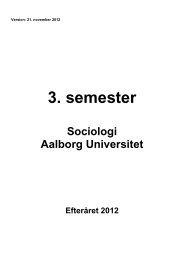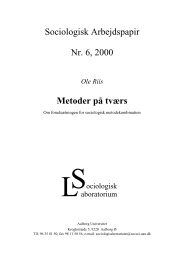Utopianism in the Work of Zygmunt Bauman - Sociologi - Aalborg ...
Utopianism in the Work of Zygmunt Bauman - Sociologi - Aalborg ...
Utopianism in the Work of Zygmunt Bauman - Sociologi - Aalborg ...
Create successful ePaper yourself
Turn your PDF publications into a flip-book with our unique Google optimized e-Paper software.
tious not to dictate how people should live <strong>the</strong>ir lives. Utopia is about <strong>the</strong> good<br />
life – and <strong>the</strong>re are many varieties <strong>of</strong> <strong>the</strong> ‘good life’ (Kateb 1973) - but just as<br />
Marx never actually depicted <strong>the</strong> content <strong>of</strong> <strong>the</strong> anticipated post-revolutionary<br />
social order, <strong>Bauman</strong> does not want ei<strong>the</strong>r to spell out <strong>in</strong> so many details what<br />
this utopian good life exactly means. He h<strong>in</strong>ts at <strong>the</strong> classical Greek and repub-<br />
lican model <strong>of</strong> citizenship, <strong>the</strong> democratic agora and <strong>the</strong> equally responsible<br />
and <strong>in</strong>terrelated oikos and ecclesia. His utopia is thus a vision <strong>of</strong> <strong>the</strong> autono-<br />
mous and self-constituted society, as he has adopted it from Castoriadis (1993),<br />
where ambivalence and difference is allowed to exist and even are valorised<br />
and where adiaphorisation and heteronomy are annihilated. In <strong>Bauman</strong>’s uto-<br />
pia, <strong>in</strong>dividuals become <strong>in</strong>dividuals de facto and not only rema<strong>in</strong> <strong>in</strong>dividuals de<br />
jure, <strong>the</strong>ir freedom is not co<strong>in</strong>ed <strong>in</strong> negative terms but <strong>in</strong> positive ones – free-<br />
dom to act <strong>in</strong>stead <strong>of</strong> freedom from want, fear or o<strong>the</strong>rwise (<strong>Bauman</strong> 2000a).<br />
This utopian model <strong>of</strong> <strong>the</strong> good society and <strong>the</strong> common good embedded <strong>in</strong><br />
democracy is perhaps not <strong>in</strong> <strong>the</strong> <strong>of</strong>f<strong>in</strong>g at <strong>the</strong> moment but as Kolakowski re-<br />
marked with clarity but also remarkable subtlety: “It may well be that <strong>the</strong> im-<br />
possible at a given moment can become possible only by be<strong>in</strong>g stated at a time<br />
when it is impossible” (Kolakowski 1969:92). When all apparently is said and<br />
done, someth<strong>in</strong>g important might have been found miss<strong>in</strong>g or someth<strong>in</strong>g could<br />
have been done o<strong>the</strong>rwise. In his classical critique <strong>of</strong> modernist utopias, A<br />
False Utopia, William Henry Chamberla<strong>in</strong> also stated that “it <strong>of</strong>ten happens<br />
that <strong>the</strong> absence <strong>of</strong> someth<strong>in</strong>g is <strong>the</strong> best means <strong>of</strong> teach<strong>in</strong>g a sense <strong>of</strong> its<br />
value” (Chamberla<strong>in</strong> 1937:v) and this is <strong>in</strong>deed what <strong>Bauman</strong> does when he<br />
p<strong>in</strong>po<strong>in</strong>ts <strong>the</strong> problems <strong>in</strong>volved <strong>in</strong> <strong>the</strong> demise <strong>of</strong> utopian th<strong>in</strong>k<strong>in</strong>g.<br />
Thus, <strong>in</strong> <strong>the</strong> dispute between those argu<strong>in</strong>g for ‘end<strong>in</strong>gs’ (cf. Bell 1960;<br />
Fukuyama 1992) and aga<strong>in</strong>st <strong>the</strong>m (cf. Jacoby 1999), <strong>Bauman</strong> clearly takes <strong>the</strong><br />
side <strong>of</strong> <strong>the</strong> latter. 13 Instead <strong>of</strong> speak<strong>in</strong>g apocalyptically <strong>of</strong> ‘end<strong>in</strong>gs’, <strong>the</strong> end <strong>of</strong><br />
democracy, <strong>of</strong> <strong>the</strong> welfare state, <strong>of</strong> collective politics, and <strong>of</strong> community, etc.,<br />
42










